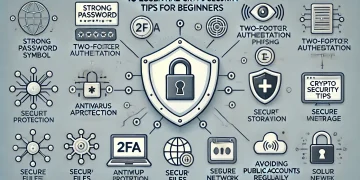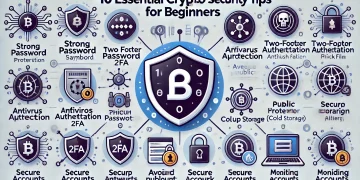As cryptocurrency adoption grows, securing digital assets has become increasingly crucial. The choice between hardware and software wallets represents a fundamental security decision for crypto investors. This comprehensive guide examines both options, their security features, vulnerabilities, and optimal use cases to help you make an informed decision about protecting your digital assets.
Understanding Cryptocurrency Wallets
Basic Concepts
Cryptocurrency wallets don’t actually store your cryptocurrencies; instead, they secure the private keys that prove ownership of your digital assets on the blockchain. These private keys are essential for signing transactions and maintaining control over your funds.
Security Fundamentals
The security of any cryptocurrency wallet depends on:
- Private key protection
- Attack surface minimization
- Recovery mechanism reliability
- User interface security
- Backup procedures
Hardware Wallets Deep Dive
Core Technology
Hardware wallets are physical devices specifically designed to secure cryptocurrency private keys. They utilize secure elements – specialized chips similar to those found in credit cards and passports – to store and protect private keys.
Security Features
Most modern hardware wallets incorporate multiple security layers:
Physical Security:
- Tamper-resistant chips
- Encrypted storage
- Physical buttons for transaction confirmation
- PIN protection
- Limited USB functionality
Operational Security:
- Offline private key generation
- Air-gapped transaction signing
- Secure element certification
- Randomization features
- Anti-tampering mechanisms
Popular Hardware Wallets
Leading hardware wallet manufacturers prioritize different aspects:
Ledger Products:
- Secure element certification
- Proprietary operating system
- Multi-currency support
- Bluetooth connectivity options
Trezor Devices:
- Open-source firmware
- Transparent security design
- Advanced recovery options
- Web-based interface
Advantages
Hardware wallets offer several distinct benefits:
Security Benefits:
- Offline private key storage
- Malware resistance
- Physical transaction verification
- Multi-signature support
Practical Benefits:
- Long-term storage solution
- Professional support
- Regular firmware updates
- Backup capabilities
Limitations
Despite their strengths, hardware wallets have some drawbacks:
Practical Constraints:
- Initial purchase cost
- Physical device dependency
- Potential shipping vulnerabilities
- Learning curve for new users
Security Considerations:
- Supply chain attacks
- Firmware update risks
- Physical theft possibilities
- Recovery phrase management
Software Wallets Examination
Types of Software Wallets
Software wallets come in various forms:
Desktop Wallets:
- Full node capabilities
- Local key storage
- Extensive features
- Platform-specific security
Mobile Wallets:
- Convenience-focused
- QR code support
- Biometric security
- Push notifications
Web Wallets:
- Easy accessibility
- Cross-platform support
- Third-party dependence
- Variable security levels
Security Architecture
Software wallet security implements multiple protective layers:
Encryption Methods:
- AES-256 encryption
- Secure key derivation
- Password protection
- Biometric authentication
Protection Mechanisms:
- Two-factor authentication
- IP address monitoring
- Automated logout
- Transaction limits
Popular Software Wallets
Different software wallets target specific needs:
Non-Custodial Wallets:
- Complete user control
- Local key storage
- Enhanced privacy
- Variable recovery options
Custodial Wallets:
- Exchange integration
- Insurance coverage
- Customer support
- Simplified recovery
Advantages
Software wallets provide several benefits:
Convenience Features:
- Immediate accessibility
- Free availability
- Regular updates
- Integration capabilities
Practical Benefits:
- User-friendly interface
- Multiple device support
- Quick transactions
- Feature flexibility
Limitations
Software wallets face certain challenges:
Security Risks:
- Malware vulnerability
- Phishing susceptibility
- Operating system exploits
- Network attacks
Practical Issues:
- Internet dependency
- Device security reliance
- Backup complications
- Recovery vulnerabilities
Security Comparison
Attack Vectors
Hardware Wallets:
- Physical theft
- Supply chain compromise
- Firmware manipulation
- Social engineering
Software Wallets:
- Malware infection
- Keyloggers
- Screen capture
- Remote access attacks
Protection Measures
Hardware Wallet Protection:
- PIN verification
- Physical confirmation
- Secure element
- Limited connectivity
Software Wallet Protection:
- Encryption
- Password protection
- Two-factor authentication
- Automatic lockout
Best Practices
General Security Guidelines
Regardless of wallet choice:
- Use strong passwords
- Enable all security features
- Maintain current software
- Follow backup procedures
Specific Recommendations
Hardware Wallet Users:
- Purchase directly from manufacturers
- Verify device authenticity
- Store recovery phrase securely
- Test recovery procedures
Software Wallet Users:
- Use reputable providers
- Enable maximum security settings
- Regular security audits
- Maintain device hygiene
Use Case Analysis
Investment Scenarios
Long-term Holdings:
- Hardware wallets preferred
- Multiple device backup
- Regular verification
- Inheritance planning
Active Trading:
- Software wallet convenience
- Quick access priority
- Balance management
- Risk distribution
Amount Considerations
Large Holdings:
- Hardware wallet priority
- Multi-signature setup
- Geographic distribution
- Regular audits
Small Holdings:
- Software wallet adequacy
- Convenience priority
- Cost-effectiveness
- Simplified backup
Frequently Asked Questions
Q: Can hardware wallets be hacked? A: While hardware wallets provide robust security, they’re not completely immune to sophisticated attacks. However, proper usage significantly reduces risk compared to software alternatives.
Q: Are software wallets safe for small amounts? A: Quality software wallets can provide adequate security for smaller holdings when proper security practices are followed.
Q: What happens if I lose my hardware wallet? A: Your funds remain secure if you have your recovery phrase. You can restore access using another device or wallet supporting the same standards.
Q: Can I use both wallet types? A: Yes, many users employ hardware wallets for long-term storage and software wallets for regular transactions.
Q: How often should I update my wallet software? A: Always install security updates immediately. Regular feature updates can be evaluated based on needs.
Q: What’s the best backup strategy? A: Multiple secure copies of recovery phrases, stored in different physical locations, provide optimal backup security.
Q: How do I protect against physical theft? A: Use strong PINs, enable all security features, and never store PINs with devices or recovery phrases.
Q: Should I keep crypto on an exchange? A: While exchanges offer convenience, personal wallets provide better security and control over your assets.
Conclusion
The choice between hardware and software wallets depends on individual circumstances, including investment size, trading frequency, and security requirements. Hardware wallets offer superior security for significant holdings and long-term storage, while software wallets provide convenience for active trading and smaller amounts.
A balanced approach often combines both wallet types: hardware wallets for secure storage of major holdings and software wallets for regular transactions and convenient access. Regardless of choice, proper security practices remain essential for protecting cryptocurrency investments.
Understanding the strengths and limitations of each wallet type enables informed decisions about cryptocurrency security. Regular review of security practices and staying informed about emerging threats helps maintain asset protection in the evolving cryptocurrency landscape.
Success in cryptocurrency security requires ongoing education, vigilance, and adaptation to new security challenges. Whether choosing hardware or software wallets, maintaining strong security practices provides the foundation for safe cryptocurrency ownership.






























